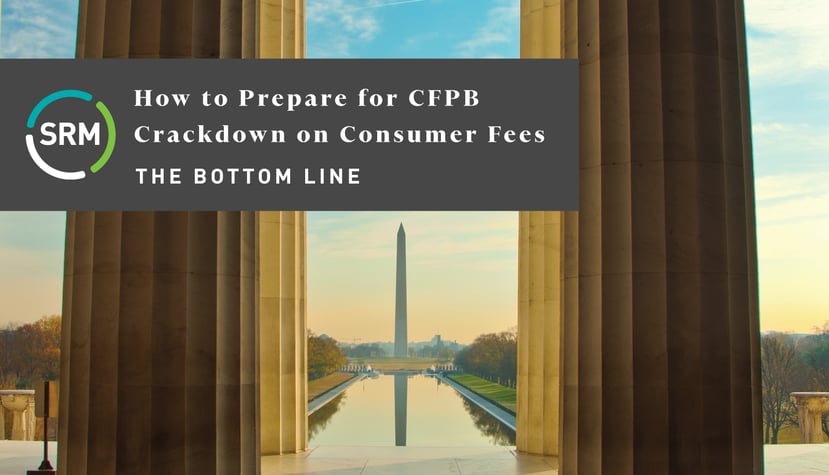
It’s not every day that a phrase as vague and slanted as “junk fees” becomes an actual legislative term, but here we are. In various statements, the White House and the Consumer Financial Protection Bureau (CFPB) have defined junk fees as “hidden or unexpected fees” and “increasingly sophisticated tools to disguise the true price consumers face.”
Although President Biden highlighted hotel resort fees, concert ticket services, and airline surcharges in his State of the Union address, the CFPB has also pushed to lower the cap for most credit card late fees from roughly $30 to $8. Limiting or eliminating NSF/overdraft fees is also high on the agency’s agenda.
SRM’s recent white paper, “Five Areas to Watch for CFPB Action,” anticipated these moves, given the current political climate and CFPB Director Rohit Chopra’s late 2022 confirmation to a five-year term. Our earlier blog delved into open banking and fintech partnerships. Let’s now dig deeper into the rapidly escalating fee battles that have attracted the attention of regulators, legislators, and consumer advocacy groups.
Consumer Fees in the Crosshairs
The first concrete swipe at consumer charges came from the CFPB on Feb. 1 via a proposed rule the agency projects would reduce a typical credit card late payment fee by nearly three-fourths, eliminating roughly $9 billion in annual revenue. The CFPB aims to reduce its “immunity provision” for late fees to $8, a level it “believes would be sufficient for most issuers to cover collection costs incurred as a result of late payments.”
Card issuers could charge more than $8 if “they can prove the higher fee is necessary to cover their incurred collection costs.” Use of the $8 figure in an official White House statement and the CFPB’s consumer savings calculations would telegraph the unlikelihood of such exemptions being approved – if any banks were bold enough to seek one.
The CFPB has also expressed its intent to scrutinize NSF and overdraft fees, declaring such fees exploitative if they “far exceed the marginal cost of the service they purport to cover.” In September 2021, the CFPB settled with Regions Bank for $191 million in penalties and reimbursements for what the agency deemed “surprise ATM withdrawal and debit card fees,” even though Regions had already discontinued the fee structure in question. While it disagreed with the CFPB’s characterizations, Regions went along with the penalty to put the issue behind it.
Several FIs are proactively eliminating or reducing fees that could run afoul of the CFPB’s proposed criteria – the White House announced that 15 of the 20 largest US banks had agreed to end bounced-check fees. Other fees are being reduced, and some smaller institutions have eliminated overdraft fees entirely, inevitably impacting their bottom lines.
FIs should assess the positioning of late fees, both their price points, and the existence of clear policies and disclosures. Provide solid documentation in support of well-designed, consumer-friendly retail products, demonstrate benefits over alternatives such as payday lending, and show evidence of market demand. Avoid models with the potential to generate fees that might be characterized as “surprises” – a key CFPB gauge for “junk fees.”
One Size Fits All?
It behooves banks and credit unions of all sizes to review and potentially curtail or eliminate fees that might draw CFPB scrutiny while simultaneously developing strategies to offset the resulting revenue gaps.
Though the CFPB only has the authority to pursue remedies from FIs with over $10 billion in assets, a widespread effort by larger FIs to lower and eliminate fees could put competitive pressure on smaller institutions to follow suit. A fee cap on big banks could be considered a de facto cap for all. Perhaps unwittingly, the CFPB tacitly acknowledges this truth by calculating potential consumer fee savings based on the entire market, not just the large banks it oversees.
The Bottom Line
Whether or not technically under the CFPB’s purview, we believe all banks and credit unions should reassess their fee strategies now. A growing number are proactively reducing fees to preempt CFPB action; while unlikely to alter the agency’s ultimate decisions, it’s nonetheless a wise move.
Our recent white paper provides further detail on these and other important regulatory factors to consider. SRM is also prepared to help you identify ways to offset lost revenue by finding new income streams or identifying cost savings.


